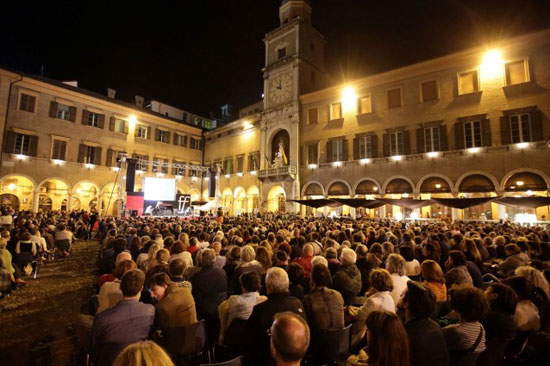Literary festivals: love of culture or social events? Meanwhile, letters and art suffer...
We have to say it: we really like literary festivals. So, when we do, we try to attend them. The dates have multiplied, the lectures and presentations are almost always of high quality, and on the side there are always lots of really interesting events. And then the cities fill up, the bars and restaurants create literary-themed menus, it is not at all remote the eventuality of meeting emblazoned authors on the street (to us, just as an example, it happened to run into Dario Fo, in Piazza Mantegna in Mantua, during a Festivaletteratura), an almost festive atmosphere permeates the streets. However, lately we have been wondering whether the glitter and mundanity of literary festivals is matched by an equal love of culture, art and literature, which perhaps is exercised daily, even when the curtains of events go down.
A Martian who were to swoop down on planet Earth and have the good fortune to choose precisely our country as his landing base, seeing the proliferation of literary festivals, and especially seeing the success with the public that they enjoy, might quietly think that festivals are but the tip of the iceberg of a reality made up of avid readers, cities that have a vast and very solid cultural offer, which lasts all year round, and that the whole thing is based on an educational system in excellent health. And the Martian might therefore decide to stay in Italy for a while to verify that his assumptions have merit. However, after a few weeks, he should unfortunately find that things are not exactly as he imagined.
He would discover, meanwhile, that according to the report on the production and reading of books in Italy, research conducted by Istat, in 2014 only 41.4 percent of Italians said they had read at least one book during the previous year: meaning that nearly 60 percent of Italians do not read books. This is a worrying share, because it should be added, moreover, that the number of readers (even of those who read only one book a year) is falling rapidly: they were more than 43% in 2013, and more than 46% in 2012. The Martian, however, would not be too surprised, because he would find that the low aptitude for reading is a vice that Italians have been carrying around since childhood: according to a recent report by Save the Children, the percentage of children and young people between the ages of 6 and 17 who have not read a book last year is 48.2 percent (rising to 55.2 percent if the question is, “Have you visited at least one museum during the past year?”). As a result, low confidence with books has relegated us to the bottom of the reading and writing skills rankings of OECD countries. And, again as a result, publishing is struggling mightily.
 |
| The audience at the Philosophy Festival in Modena’s Piazza Grande. Photo by Fanpage.it distributed under a Creative Commons license. |
These data, however, might, who knows, lead the Martian to think that perhaps this situation is not a true mirror of our country, and that the cities that host literary festivals are happy islands that devote great attention to culture and education. But even then he would be disappointed. In Modena, home of the Philosophy Festival, three historic bookstores have been forced to close their doors in the past year alone. It is no better in Sarzana, which hosts the Festival of the Mind: last year one of the main bookstores in the Ligurian town closed after 30 years of operation. And the funny thing is that the establishment was responsible for organizing the Festival bookstore. And again, in Aulla, located just a few kilometers from Sarzana, elementary and middle school children will be forced, again for this year, to attend their classes inside containers, because their school was affected by the flood that swept through Lunigiana and Levante Ligure on October 25, 2011, and after four years their school’s new location has still not been built. And many of those children don’t even know what a real school looks like.
Even the Mantua of what is probably the best-known festival in Italy, the aforementioned Festivaletteratura, has its own problems: just by way of example, the Liceo Classico in Castiglione delle Stiviere lost its premiere this year, the mayor of Solferino is asking for help because the municipality does not have the funds to carry out renovation work on the school complex (which also includes a library), and in the scientific high school in Viadana serious problems of decay have been reported. And let’s not talk about Carrara, which hosted this year’s 10th Con_Vivere Carrara Festival: a city without a cinema, an absent concert program, two out of three theaters closed indefinitely. Located in a province where this summer the idea of reorganizing the school week over five days instead of six was aired due to lack of resources and consequent need to have to save money.
The question then is: do literary festivals conceal a visceral love of letters on the part of their audience, or are they (or have they become) just a mundane “happening”? And, if the second question is true, in order to improve the conditions of our schools, bookstores, museums, theaters and in general everything that revolves around the concept of culture, will it be the case that activities such as studying, reading a book, observing a work of art should be given a fashionable veneer? Who knows, maybe some results will be achieved?
Warning: the translation into English of the original Italian article was created using automatic tools. We undertake to review all articles, but we do not guarantee the total absence of inaccuracies in the translation due to the program. You can find the original by clicking on the ITA button. If you find any mistake,please contact us.





























